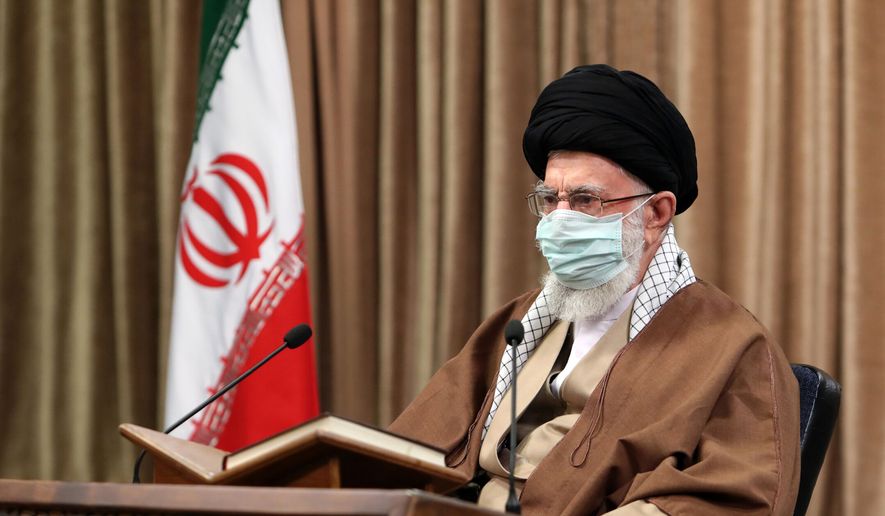Iran’s supreme leader on Wednesday slammed the latest U.S. offer for renewed nuclear diplomacy, but the White House was undeterred, with officials saying they are preparing for “a long process,” even as Tehran ramps up its uranium enrichment to near bomb-grade levels.
White House press secretary Jen Psaki told reporters that “indirect” talks with Iran — Iranian officials refuse to meet directly with their American counterparts — will reconvene Thursday in Vienna, with European diplomats shuttling messages between the two sides in hopes of reviving the beleaguered 2015 Iran nuclear deal.
However, it was still unclear whether the Iranian delegation will show up, with Tehran still reeling from a mysterious attack targeting its main nuclear production facility last week.
Iranian Supreme Leader Ayatollah Ali Khamenei on Wednesday dismissed offers that U.S. officials are putting forward as “not worth looking at” so long as punishing sanctions imposed by the Trump administration remain in place.
The comments by the ayatollah, who has final say on all major matters of state in the Islamic republic, mark an attempt to ratchet up pressure on Washington and other world powers following the suspicious power outage at Iran’s Natanz nuclear enrichment facility that Tehran claims was caused by an Israeli sabotage operation.
The Natanz incident was viewed as a potential attempt to derail the Biden administration’s pursuit of renewed diplomacy with Iran. Israel and its backers on Capitol Hill has long condemned the deal struck by the Obama administration when Mr. Biden was vice president, and Israeli Prime Minister Benjamin Netanyahu vowed again this week that Iran would never possess nuclear weapons.
A top Iranian official this week said Tehran was preparing to ramp up uranium enrichment to a level of up to 60%, closer to the level needed to produce a nuclear bomb and a clear violation of limits set in the 2015 accord.
European powers, which have desperately tried to keep the Iran deal alive in the face of Mr. Trump’s efforts to kill it, expressed “grave concern” in a joint statement Wednesday at Iran’s latest enrichment threat.
“This is a serious development since the production of highly enriched uranium constitutes an important step in the production of a nuclear weapon. Iran has no credible civilian need for enrichment at this level,” the statement by the governments of France, Germany and Britain said..
“We also express our concern at the news that Iran plans to install 1,000 additional centrifuges at Natanz [nuclear plant], which will significantly increase Iran’s enrichment capacity,” the European statement added.
Diplomats acknowledged they were not even certain Iran would send a negotiating team to the next round of indirect talks in Vienna.
The uncertainty only increased with the unusually sharp comments from the Supreme Leader Wednesday, in an address marking the first day of the Muslim fasting month of Ramadan in Iran. The U.S. proposals for both Washington and Tehran to takes coordinated, reciprocal steps to come back into compliance with the 2015 deal “are usually arrogant and humiliating [and] are not worth looking at,” the ayatollah said, according to the Associated Press.
In Washington, Ms. Psaki told reporters that the Biden administration is “very open-eyed” about the difficulties of reviving the nuclear deal with Iran, but believes the indirect discussions will continue.
“The diplomatic conversations, though they will be indirect, will reconvene tomorrow in Vienna. We know this will be a long process but we certainly see that as a positive sign,” she said, according to Reuters.
“Our understanding,” she added, “is [the Iranians] plan to attend.”
Mr. Biden’s promise to revive the 2015 Iran nuclear deal repudiated by President Trump in 2018 has gotten off to an unexpectedly slow start.
Under the original nuclear deal, the U.S. and other world powers — China, Russia, Britain, France and Germany — eased economic sanctions on Iran in exchange for limits to and U.N. inspections of Tehran’s suspect nuclear programs, which critics say are pushing Tehran closer to building nuclear weapons.
The United States has been reimposing a raft of sanctions on Iran and its trading partners since Mr. Trump’s withdrawal, while Iran has been ratcheting up nuclear enrichment and ballistic missile activities banned by U.N. Security Council resolutions.
Iran is demanding the Biden administration lift all Trump administration sanctions before it will even agree to negotiations. Biden administration officials have said they are prepared to lift the sanctions, but only after Tehran comes back into compliance by capping its enrichment back down to low levels set by the 2015 deal — roughly 3.8% for civilian electricity generation purposes.
• Guy Taylor can be reached at gtaylor@washingtontimes.com.




Please read our comment policy before commenting.